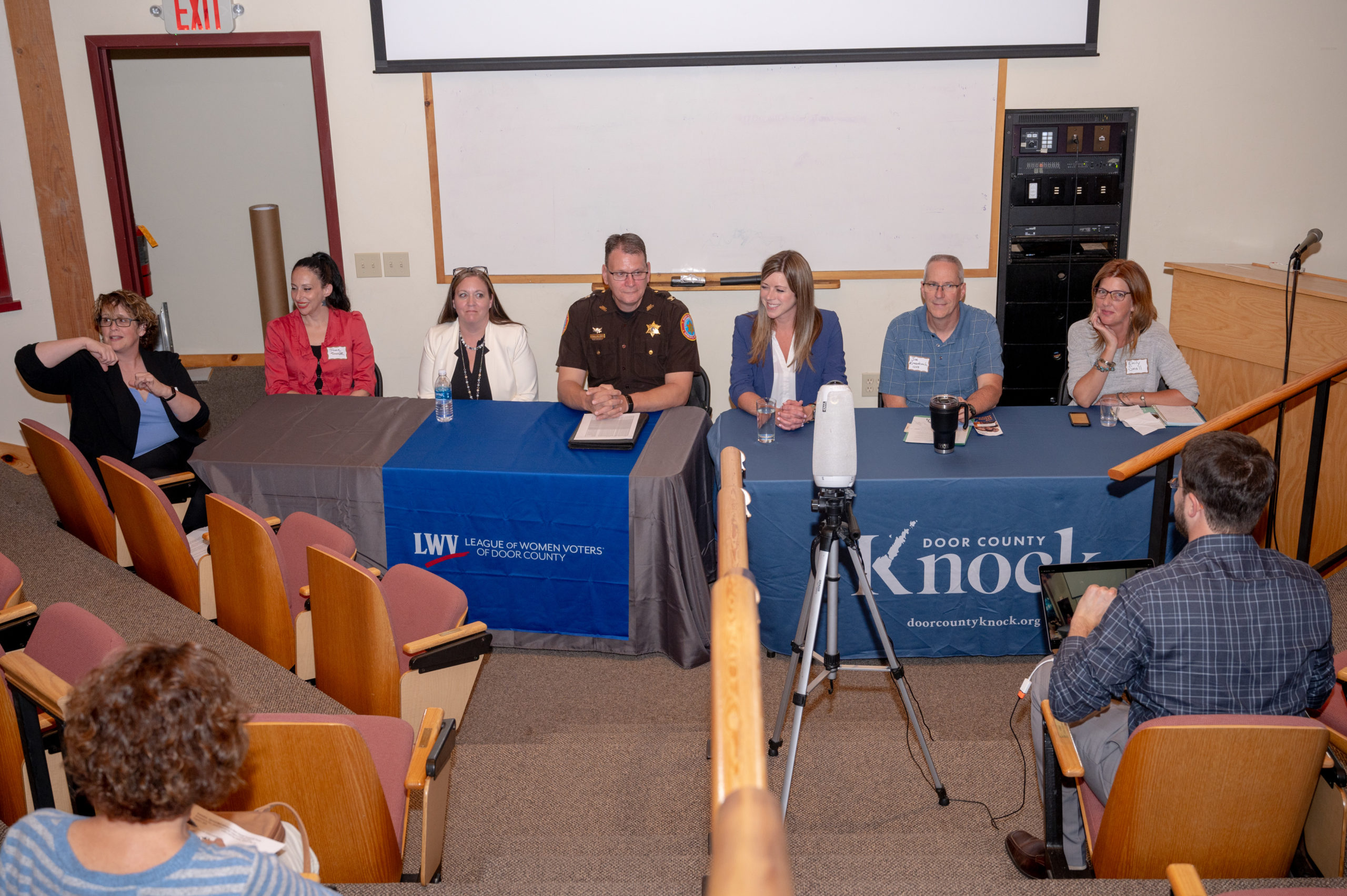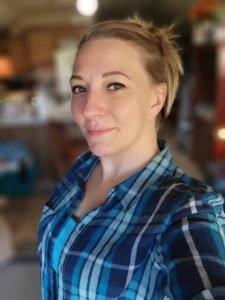This story is part of a series on opioid and methamphetamine addiction in Door County.
This story contains descriptions of a suicidal situation. If you or someone you know is in crisis, call or text 988 for the Suicide and Crisis Lifeline, or contact the Crisis Text Line by texting TALK to 741741. To contact Door County Health and Human Services about mental health or substance abuse services, call 920-746-7155 during business hours.
“My childhood was like being on the ocean in a tsunami. I didn’t let it control me; I could’ve easily followed my mom’s direction, as lots of kids do when a parent is absent. But I chose to write my own story and not follow someone else’s. Sometimes controlling your ship can be hard, especially when that’s the only direction you know to go, but you have to take the right direction and stand for yourself. Surround yourself with good people; that will help lead you in the right direction.” —Sixteen-year-old Kayla Ranly, in a speech for a school assignment.
Kayla Ranly lives in Sturgeon Bay. Her mother, Stephanie Short, battled substance use disorder and addiction for most of Ranly’s young life. Family history of drug use is one of the biggest risk factors for a child or teen developing a substance use disorder of their own. Ranly attributes connection to her community through athletics, and her dad’s consistent support, for her not following the same path her mom did.
According to those in the treatment and recovery communities, there are no quick fixes for substance use disorder. However there are things that can be done, and are being done, in Door County to combat it locally. Reaching statistically at-risk youth like Ranly is one of them.
What is done and yet to do
There are a few promising recent developments in the county’s attempt to grapple with substance use disorder. A grant-funded program that works with youth in the Sturgeon Bay School District launched this fall. United Way of Door County is implementing social development programming as well. The Door County Sheriff’s Office has plans to hire a social worker in the next year as part of its crisis management team, addressing the persistent overlap between behavioral and mental health and substance use disorder,
The county also has developed an adult drug treatment court program. It is in its infancy and is not a one-size-fits-all approach, according to District Attorney Colleen Nordin. The county Department of Health and Human Services, through the adult drug treatment court program, hired a peer support counselor in August, in an attempt to bridge some gaps in services.
Currently, HHS is “the only game in town” as far as treatment options, said HHS director Joe Krebsbach. Door County has no inpatient treatment facilities and a dearth of sober living or transitional housing, he said.
Additionally, political action is necessary, according to Dan Powers, who works with the League of Women Voters of Door County to lobby lawmakers about the organization’s core issues. If a community wants to address substance use disorder, knowing how county and state representatives feel about the issue is key, Powers said, and voters must contact them to push for sober living and alcohol and other drug abuse treatment and prevention funding.
A public forum held in August on opioid and methamphetamine addiction addressed what is being done and what there is yet to do to combat this issue. The event, co-hosted by Knock and the League of Women Voters, included several panelists:
- Joe Krebsbach, director of the county’s Department of Health and Human Services
- District Attorney Colleen Nordin
- Sheriff’s Office Chief Deputy Pat McCarty
- Lisa Barnaby, an alcohol and other drug abuse and behavioral health therapist contracted with the county’s drug treatment court program
- Timmie Sinclair, community impact coordinator at United Way of Door County
- Jennifer Singer, a recovering heroin addict, treatment court graduate and board member of the 115 Club, a recovery-based organization in Sturgeon Bay
Roughly 30 total audience members attended in-person and virtually.

Recovering out loud
Door County has a small recovery community, according to individuals in recovery who spoke at the forum. The 115 Club in Sturgeon Bay hosts 12-step-based programs and sober activities, as well as providing a safe and sober place to gather and get information. (Disclosure: Knock board member Peter Mannoja is The 115 Club’s president.)
Additionally, SMART Recovery is a science-based, secular recovery program focusing on any harmful addictive or negative behavior, according to its literature. The program meets Sunday mornings at Prince of Peace Lutheran Church in Sturgeon Bay.
Stephanie Short, a certified peer support and recovery coach, is a member of the local recovery community. Originally from Door County, Short has a long history of substance use disorder, which included dealing drugs to support her meth habit, she said. Her children were taken from her and placed in foster care and with other family members, and she spent time in jail for dealing drugs and other crimes. She has been sober for 2 ½ years.
As a peer support and recovery coach, Short works with her clients to promote positive change in their lives, using her own lived experience to connect with and support people facing mental health and substance use issues. Helping clients navigate treatment systems and find resources is part of her job as well, according to Short.
Short’s perspective on the criminal justice system might be different than some who have been through it, she said. Every time she went to jail, she got sober, and that intervention saved her life several times, she said.
The last time she was in jail, she woke up in the middle of the night, shaking, sweating, heart racing. “I knew I wasn’t getting out of jail alive if I didn’t do something differently,” she said. A program to help inmates deal with substance use disorder and other issues called Living Free, offered through the Kenosha criminal justice system, gave Short the direction she needed to do just that.
“I threw myself into the program and learned everything I could,” she said.
What she learned is recovery begins from the inside. Self-love and self-acceptance is what finally pulled Short from the grip of addiction, she explained. She learned new ways to cope with trauma responses, mental health issues and the stress of daily life.
Even though she is no longer the woman who was arrested with enough drugs to get charged with distribution in a Shopko parking lot, she is grateful for that person. “She (her past, addicted self) kept me alive … she got me here,” Short said.
Short worked at the Gathering Place in Green Bay, a peer-run recovery organization, after getting out of jail. She said she wanted to use her experience to help others come to grips with their substance use disorder.

Armed with a certification as a peer support specialist, full-time enrollment in a health and wellness program at NWTC, and a determination to make her dreams a reality, Short recently secured a contract with the Door County treatment court program as the team’s first certified peer support counselor. She said she is excited to start seeing participants and help bridge some of the gaps she sees.
There is tremendous stigma around being addicted to drugs and alcohol, and Short claimed there is not much to do besides go through it. “Someone is always going to judge you,” she said, and self-acceptance is how she gets past the stigma. She continues to share her story publicly.
Stigma goes both ways, Short added. Viewing cops and lawyers and judges as the enemy is not going to do anything but strengthen barriers to getting people the help they need, she said.
“We need to identify the positive things we have going on and build on that instead of complaining about the problems,” she said.
We’re all human
Deputy Curt Vandertie with the Door County Sheriff’s Office got into the first responder field as an EMS member because he wanted to help people, he said. His calling was on display when Vandertie showed up to an unfolding crisis in Sturgeon Bay in October 2021. Jennifer Singer was on the second story roof of her residence, using drugs and threatening suicide.
Officers had already tried pulling Singer through a skylight, ripping her shirt off in the process. When Vandertie arrived, he started by listening to her, he said. Vandertie has special FBI training in crisis management and negotiation.
Over and over, he told her he cared what happened to her, that he would help her. He got her a cigarette. He got her a shirt. Finally he got her to come in off the roof and go willingly into custody.
That arrest precipitated Singer’s participation in the treatment court program. Almost two years later, Vandertie was at her graduation from the program this August. The two hugged each other. Both cried. They had not seen one another since the morning after her arrest when Vandertie visited her in jail.
Vandertie’s perspective demonstrates an evolving and more open law enforcement environment, and it is a perspective shared by McCarty, the Sheriff’s Office chief deputy. The vicarious trauma of dealing with victims and horrible scenes is cumulative, McCarty said at the forum, and for years there was little acknowledgment or help available to officers. In his 30-year career, McCarty said, he has seen an atmosphere of machismo and secrecy around these issues begin to dissipate as younger officers rise in ranks.
Peer and internal support programs have been developed to help officers cope with the mental health stresses of the job, McCarty said, and this support leads to better policing and extends to addressing the mental health component that is virtually inseparable from substance use disorder and related crimes.
The Sheriff’s Office has received grant funding to hire a social worker, according to McCarty. The social worker would be embedded with law enforcement and co-respond to mental and behavioral health calls, he added. The position and funding still need to go through the County Board budget approval process, but McCarty said he is very optimistic that the Sheriff’s Office will be able to hire someone in 2024.
Planting cherry trees
Timmie Sinclair is tired of the way America has been framing AODA education and prevention since the 1980s, with campaigns like “Just Say No” and programs like D.A.R.E. Abstinence-only education does not work and alienates half of the kids right away, said Sinclair, the United Way community impact coordinator. She is in charge of the organization’s social development programs, and one of its focuses is AODA prevention and education.
Social development strategy is a better way to go about AODA education and prevention than traditional abstinence-based education, Sinclair said. It means giving young children skills beyond the classroom and an opportunity to use those skills in their communities, rewarding them for their successes.
Sinclair used as an example an underwater robotics workshop United Way recently sponsored. Children and families were invited to build and use underwater remote-operated vehicles to perform tasks in Lake Michigan waters, such as collecting water samples or counting underwater organisms.
For Sinclair, giving kids an opportunity they might not get elsewhere can show them how they can be a useful and a connected part of their community, leading to better outcomes overall.
As far as AODA education, communities need to be realistic, Sinclair said. Kids are going to try things like vaping, marijuana, and alcohol, and these days, that could include taking a pill someone brought to school or ordered online, she added. That pill could easily include fentanyl, a highly addictive and potent opioid added to many illicit substances.
Kids need to know what to do in the event of a drug overdose or alcohol poisoning, according to Sinclair. Instead of trying to scare them straight, we should be equipping them with the tools and skills to respond when developmentally normal experimentation goes wrong, she said.
“As far as I’m concerned, every kid should have Narcan in their backpack,” she added, referring to a medication used for the emergency treatment of an opioid overdose.
Besides United Way’s social development programming, Sturgeon Bay School District and the county HHS department recently received a Youth Justice Innovation grant for a new program for kids between third and eighth grades who are having problems with emotional regulation and behaviors in the school setting, even after being provided regular school interventions, according to Krebsbach.
Those kids would be given the opportunity to go to the Boys & Girls Club of Door County, which is partnering with HHS and the school district, for part of their school day. The focus of the program is on helping the kids learn new skills, Krebsbach said.
Prevention and education efforts are akin to planting cherry trees, Sinclair said. They take several years to bloom, but the investment is worth it. She said she would love to see the day when we as a society are not just reacting to but preventing substance use disorder and its attendant harm.
No neat bow
Everybody loves a redemption story. However, the truth about substance use disorder is not that simple, according to Singer, who is recovering from opioid addiction. Less than two weeks after her graduation from Door County’s drug treatment court program and her nine-month mark of sobriety, Singer relapsed.
She said she is trying to pick up the pieces to get back on the road to recovery again. This time she wants to define what recovery means for her, and what she wants her future to look like. Since being involved in the criminal justice system, the choice to get sober was not hers alone, Singer said. Her recovery process has been dictated by the government and treatment providers.
“They call it accountability, but it’s really terror,” Singer said, “and fear-based recovery is not long-term recovery. I made the choice that I didn’t want to be in active use a long time ago. I didn’t need the law to tell me to do that.”
However, people suffering from substance use disorder do need individualized, integrative treatment, understanding, and support, according to Short, the peer recovery specialist. It is not easy or straightforward. Everyone’s disease and path to recovery is as different as the individuals themselves, she said.

